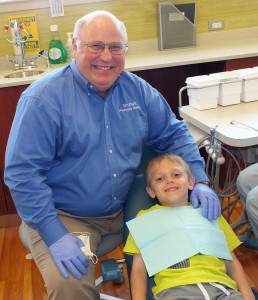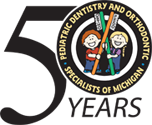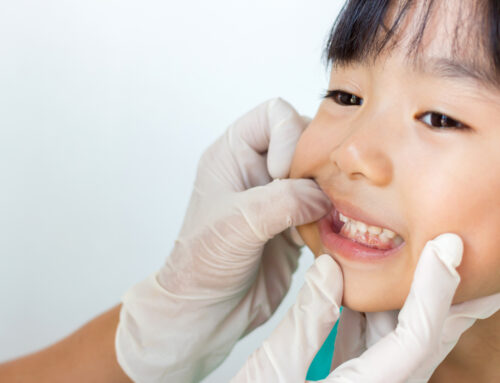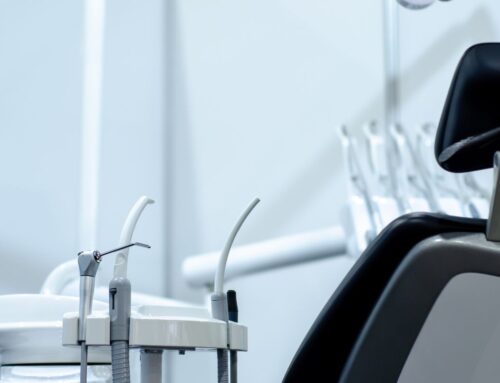Besides visiting your dentist for your regular checkups and eating right – brushing, flossing, and rinsing are the most important things you can do for your teeth. We often get questions about the proper way to brush and floss and what products to use, so we thought we would address the best ways to go at it in this weeks blog post!
Brushing
You should brush at least twice a day. You can also brush 30 minutes after you eat. You only need a pea-size amount of toothpaste. Talk to your dentist about fluoride toothpastes that are right for your family (TIP: whitening toothpastes used everyday have abrasive particles and can lead to unwanted wear on the enamel). At a 45-degree angle, move your toothbrush in a circular motion against your teeth and up to the gum line to achieve full plaque removal. Make sure you get the top teeth and bottom teeth, both front and back. Angle your brush to get behind teeth too. Be sure to get into all crevices and between teeth as much as possible with the bristles. We suggest using an electric toothbrush at least once a day for two minutes if you are getting reports when you visit the dentist that you are missing some plaque. You can also gently brush or use a tongue scraper on your tongue to get rid of bacteria that cause bad breath. Replace your toothbrush or the head of your electric toothbrush at least every three to four months.
 Flossing
Flossing
Flossing is just as important as important as brushing. It is complicated by the presence of orthodontic appliances but that can be overcome with more time or a waterpik to assist. Research has shown flossing to be slightly more effective when done before brushing but, whether you do it before or after brushing, you should make it a routine to floss your teeth at least once a day. There are a variety of flosses on the market; find the one that best suits your needs. Remove about an 18-inch piece of the floss from the dispenser or use plastic disposable flossers. Wind it around a finger on each hand to expose about a two-inch piece of floss. Use this piece to get in between your teeth by pushing the string between teeth and up to the gum line. Move the floss up and down forming a C shape around the gum line. Don’t push so hard that you injure your gum line. Wind the floss to expose a fresh piece of floss as you move from tooth to tooth or rinse your floss under water as you move along. Go in the order of teeth that best suits you but remember to get them all including behind that last molar.
Rinsing
Rinsing is much easier! Pick a rinse that is right for you and your family. Some may contain fluoride or whiteners and some have alcohol and some do not. A fluoride rinse should not be used before brushing. It should be used after the completion of the rest of the oral hygiene routine with nothing to eat or drink afterwards. Discuss with your dentist the one that best fits your needs. Rinsing is important to keep cavities away by disrupting or killing bad bacteria, help to keep breath fresh, and can reinforce gum and tooth health. You can rinse either before or after brushing. You should swish the rinse in your mouth for at least 30 seconds. It is often most useful to rinse right before bed to lower the bacteria load in your mouth as during the night your mouth will be much more dry than during the day and the bad bacteria are happier and more productive in dry environments.
We hope these tips help you maintain a truly exceptional smile! Happy Brushing, Flossing and Rinsing!!!
About Pediatric Dentistry and Orthodontic Specialists of Michigan, the offices of Drs. Delaney, Plunkett, Ralstrom, Makowski, Thanasas, Ker, and Associates
Pediatric Dentistry and Orthodontic Specialists of Michigan have specialized in pediatric dentistry and orthodontics since 1968. Our family-friendly office gives patients and families a more comfortable and consistent experience with dentistry from the very beginning. The pediatric dentists treat children from newborn to 18 years of age while our orthodontists provide care for both children and adults, including being an Invisalign preferred provider. The ability to treat all special needs patients reaches beyond our facility, which has treatment rooms available for children who require additional privacy. Valued hospital affiliations allow dental services to be performed at DMC Children’s Hospital and St. John’s Hospital Macomb when needed. Our specialists are also on staff at Henry Ford and Beaumont hospitals.





